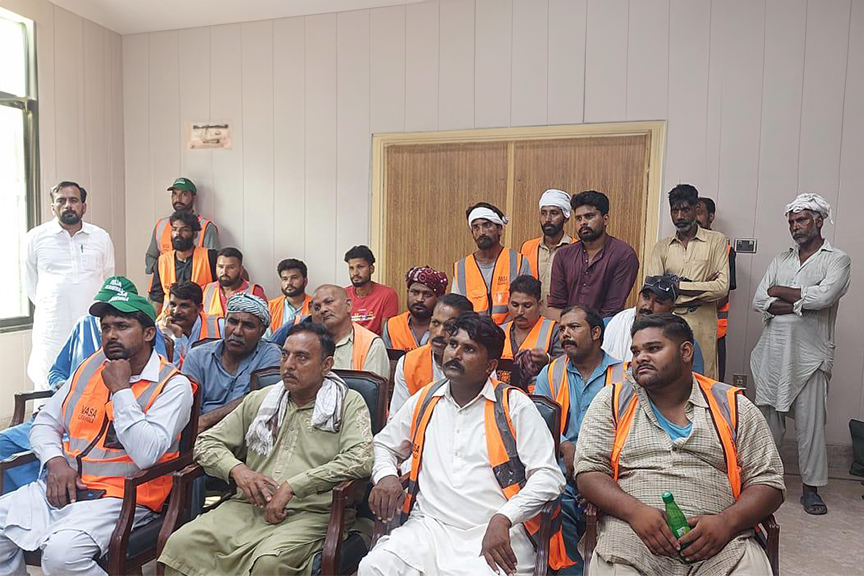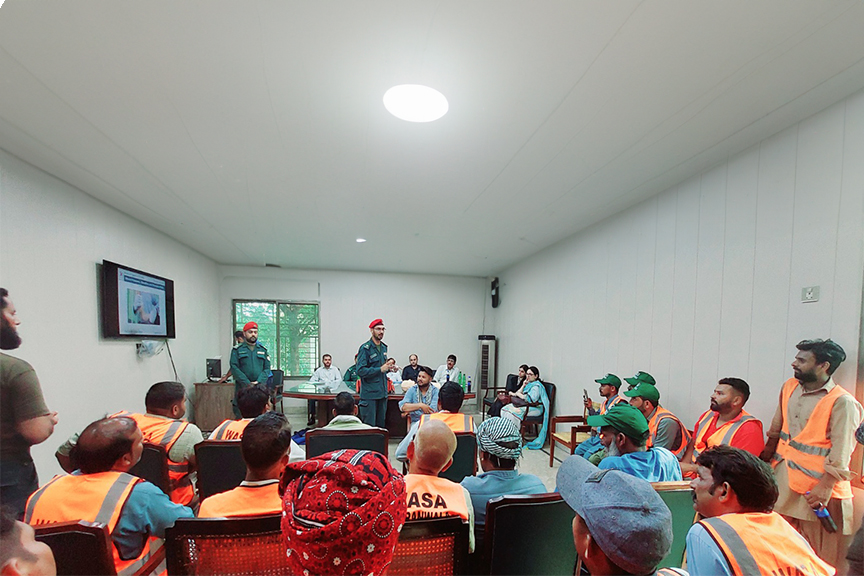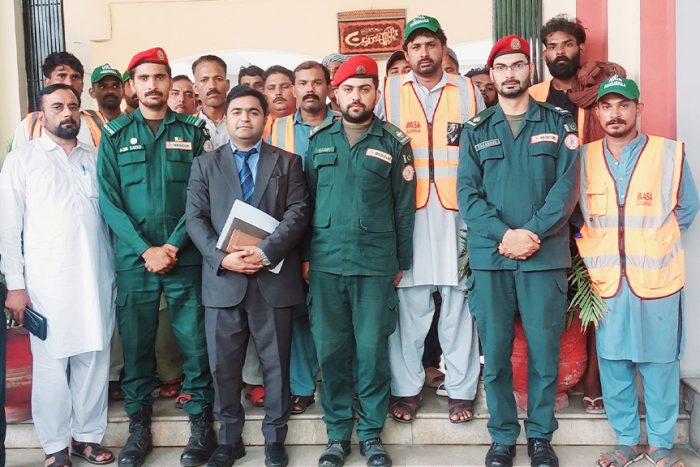Shining Through the Shadows: How Training Improved Sohail’s Life and Safety at Work
Sanitation workers like Sohail Masih are the unsung heroes of public health in Pakistan, ensuring cities like Gujranwala stay clean despite facing immense challenges. Often hailing from religious minority communities, these workers face systemic discrimination, job insecurity, and work in hazardous conditions. The struggle for dignity and safety in his dangerous job as a sanitation worker has been both a professional and personal battle for the 32-year-old father of three.
“I’ve been in this occupation for generations,” Sohail reflects. “My uncle, his sons, my brothers—it’s been sanitation work for all of us. There are limited job opportunities for people like us in this country.” This sentiment is shared by many in the Christian community, where sanitation work has been passed down through the generations, creating a sense of inevitability about the future.

However, the dangers associated with this work are impossible to ignore. Cleaning manholes, disposing of hazardous waste, and working with open drainage expose Sohail and his colleagues to toxic gases such as methane and hydrogen sulfide, increasing the risk of infections from biohazards. His fears were heightened in 2020 when two of his colleagues tragically died[1] in manholes due to inadequate safety measures and lack of training.
For years, Sohail and many others continued the dangerous work without formal training or safety protocols, learning only through trial and error. “When I was hired, they only gave us gloves and masks and how to use them,” Sohail recalls. “After that, we learned everything through experience—working with open drainage, detecting gas, cleaning wounds, and more.”
But in July 2024, advocacy efforts led by the National Lobbying Delegation for Minority Rights (NLD), supported by Community World Service Asia (CWSA) and partners, focused on promoting social justice and inclusion for marginalised communities across three districts of Punjab: Sheikhupura, Gujranwala, and Sargodha, resulted in a breakthrough. These efforts involve engaging with government officials, municipal authorities, and sanitation workers’ unions to address critical issues such as job regularisation, the provision of safety kits, and the implementation of safety training.
Sohail and 24 of his colleagues attended a life-saving training session conducted by Rescue 1122. It was the first training of its kind in 25 years, and it provided Sohail with the essential emergency response skills he had never had access to before. “This training is something that was done for us for the very first time,” Sohail explains. “After this training, I learned how to save my own life and the lives of others.”
The two-hour session covered everything from CPR to rescuing unconscious workers from manholes. Sohail recalls how the training transformed his approach to emergencies. “Previously, when we went into the gutter, another worker would pull the rope from above. If someone fainted down below, we would go down to check on them. I’ve learned through this training that we should pull the person up using a lever and perform CPR immediately—something that wasn’t a common practice before.” This training enabled Sohail to learn new skills and gave him the confidence to act when danger struck. “I used to feel helpless in emergencies, but now I know exactly what to do,” he shares with a sense of pride.

The need for this type of training is immense, especially when considering the dire safety conditions that persist in Punjab. Among the province’s 229 municipal committees, only 10 provide adequate first aid kits, 89 have no safety equipment and 130 have basic items like gloves and masks. This leaves thousands of sanitation workers like Sohail vulnerable to severe injuries or even death.
Sohail is now calling for more systemic change. “There should be quarterly training sessions,” he insists. “They should also address our challenges and provide solutions. We truly need these new training methods to ensure our safety.”
Through persistent lobbying with the Water and Sanitation Agency (WASA) in Gujranwala and other municipal departments, the NLD and CWSA continue to push for regular training sessions, allocation of funds for safety equipment, and the inclusion of sanitation workers in social security networks.
The NLDs are advocating against generational classism by promoting equal opportunities for marginalised communities. Their efforts focus on implementing a 2% education and 5% job quota, inclusion in social welfare systems, and combating workplace discrimination to help these communities break the cycle of poverty and access diverse job opportunities.
For instance, the NLDs have tackled religious bias in job advertisements, such as removing requirements for specific religions in sanitation jobs, with support from the National Commission for Human Rights (NCHR) and the One Man Commission Office. These initiatives aim to promote fairness and reduce discriminatory practices in employment. As Sohail continues his work, his newfound skills protect him and inspire hope among others in the community, serving as an example of what can be achieved through advocacy and training. While much still needs to be done to ensure the safety and dignity of sanitation workers across Punjab, the right resources and support can help workers rise above the shadows of their dangerous and undervalued work.







